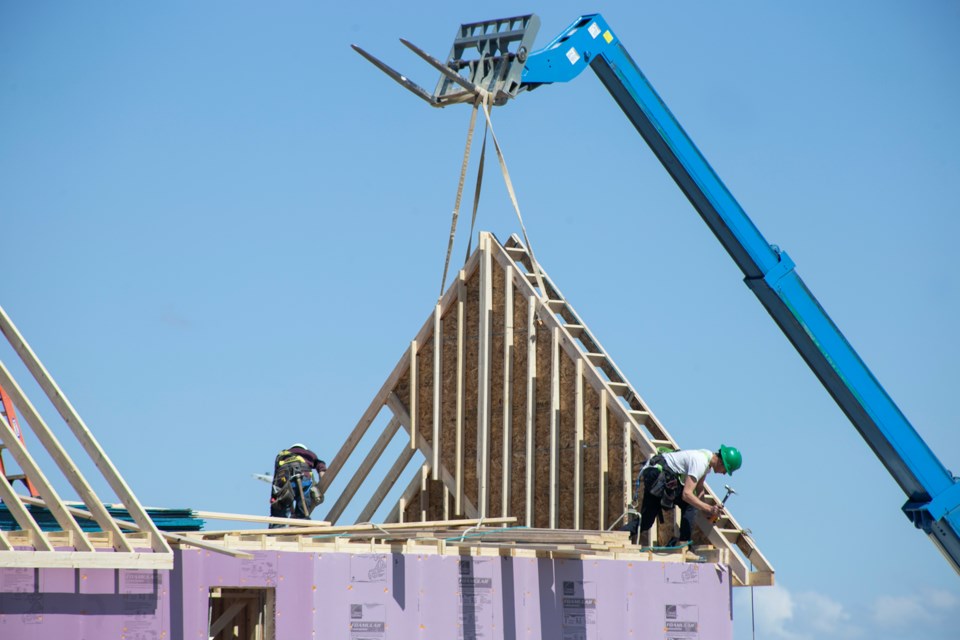Balancing safety concerns in the face of COVID-19 with the building of essential housing projects has been a challenge for one Guelph-based builder, but after initially shutting down its many job sites, Fusion Homes has come up with a plan to continue its work.
Making the job sites safe for its workers, tradespeople and end customers was the most important consideration before construction could continue, said Lee Piccoli, founder and CEO of Fusion Homes.
On March 19, the company shut down all of its Guelph job sites, including Solterra in the south end, The Glade in the east and the Annex at Chillico Run in the west end, as well as the Copper Club at The Metalworks in the Ward. The company also closed its two projects in Kitchener.
Piccoli said a team was put together within the company to determine how to make the job sites as safe as possible for everyone involved.
“The criteria was, would we feel comfortable going to work there? Would we feel comfortable sending our kids to work there?” said Piccoli. “We said until we felt comfortable with us and sending our children to go work there, that we wouldn’t send anybody else.”
One challenge, said Piccoli, was that no guiding principles were set by the provincial government, leaving the industry to its own devices on ways to solve the problem of safety for workers and customers.
New residential construction projects which have existing permits are considered to be essential projects by the provincial government and allowed to be worked on.
“So this only applies to projects we had permits for as of three weeks ago, when Premier Ford announced we were not allowed to start anything new,” Piccoli said.
In speaking to others in the industry, Piccoli said he heard everything from a business-as-usual approach by some companies to complete shut down of job sites for others.
“Some of them were telling their employees to just use common sense and some of them were on the other extreme and decided to close down their job sites,” he said.
Fusion Homes came up with a system Piccoli hopes is a happy medium.
The team put together a set of principles it called the Safe Work System, which include: a clean and sanitary job site, ways to maintain and enforce physical distancing, as well as screening and testing.
Morning meetings are now done virtually or in very small numbers. Every worker or tradesperson attending one of the company’s job sites must first check in to the site office.
A hand washing station is provided at the site office, with gloves and hand sanitizer made available to everyone. Workers and tradespeople can also opt for a voluntary temperature reading by an infrared thermometer.
The number of portable toilets on each site was doubled and the company brought in some with built-in hand washing sinks.
“We also put a certain colour of tape on their hard hat — a different colour for every day of the week — just so when we see people walking around the job site we can tell who has checked in or not,” said Piccoli. “When they check in we know which houses or which part of the site they are going to be working at, so we can keep a log of those sorts of things in case someone starts to show symptoms, that we know where they have been and who they have been in contact with.”
“We have someone going out to job sites every day to make sure all of this is being enforced,” he added.
Only one employee or tradesperson is allowed to work inside each home at a time, which ensures physical distancing is maintained at all times. Under normal circumstances, many people could be working on a home at any one time.
Masonry or framing work requires more than one person to be working on a home at one time, but the number of workers on site at any one time is dramatically reduced.
In the last step before a house is handed over to the end customer, a fogging machine is used to sanitizes and disinfects every single nook and cranny in the house.
The cost of all of those initiatives, said Piccoli, is a 30 per cent increase in the amount of time it takes to complete each home.
Piccoli said he heard a lot of customer anxiety about possibly not being able to get into their new homes during the COVID-19 crisis.
“It gave us more motivation to try and find a way to work safely, because the impact is pretty far-reaching for these people,” he said. “Having a roof over their head is pretty essential.”
